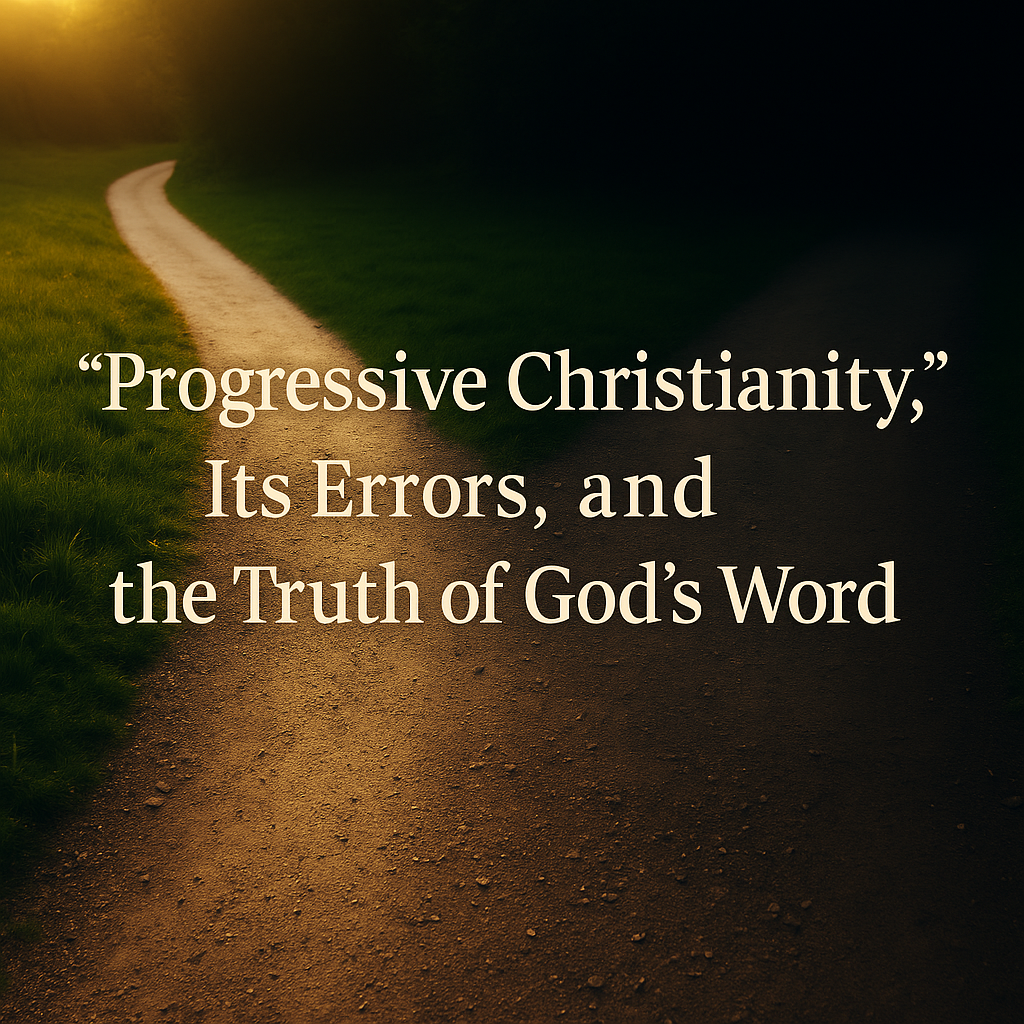⏱️ Estimated Reading Time: 3 min read
“Progressive Christianity,” Its Errors, and the Truth of God’s Word
Question: What is “progressive Christianity,” and why is it unbiblical?
Introduction
“Progressive Christianity” is a fast-growing movement that claims to make the faith more relevant, compassionate, and inclusive. But what is “progressive Christianity,” and why is it unbiblical? Beneath its appealing language lies a message that denies the authority of God’s Word and undermines the gospel itself.
What “Progressive Christianity” Teaches
- Denying the authority of Scripture, treating the Bible as a flawed human record rather than the inspired Word of God.
- Redefining Jesus, portraying Him as a mere moral example or social revolutionary rather than the crucified and risen Savior.
- Altering the gospel, centering social justice or personal authenticity rather than repentance and faith in Christ.
- Revising morality, affirming lifestyles and practices the Bible calls sin.
- Emphasizing feelings over truth, elevating personal experience above God’s revelation.
In short, “progressive Christianity” keeps Christian language but empties it of biblical meaning.
Why “Progressive Christianity” Is Unbiblical
- Rejects biblical authority. “All Scripture is breathed out by God and profitable for teaching, for reproof, for correction, and for training in righteousness” (2 Timothy 3:16–17). “Progressive Christianity” treats Scripture as optional.
- Denies the exclusivity of Christ. Jesus said, “I am the way, the truth, and the life” (John 14:6). “Progressive Christianity” often promotes pluralism.
- Redefines sin and salvation. Scripture teaches sin is rebellion against God (Romans 3:23) and salvation is by grace through faith in Christ (Ephesians 2:8–9). “Progressive Christianity” shifts the focus to works-based social causes.
- Undermines the gospel. Paul warned that any “different gospel” is accursed (Galatians 1:6–9). “Progressive Christianity” preaches another gospel.
- Produces false assurance, comforting people in their sin instead of calling them to repentance and faith in Christ.
A Biblical Response
- Hold fast to God’s Word. Scripture is the final authority for faith and practice.
- Proclaim the true Christ. Fully God, fully man, crucified and risen Savior.
- Keep the gospel central. Not self-fulfillment but salvation in Christ alone.
- Speak the truth in love. Many drawn to “progressive Christianity” seek compassion; point them to the real love of God in Christ.
- Contend for the faith. Jude 3 calls us to defend the truth once for all delivered to the saints.
Conclusion
“Progressive Christianity” may sound loving and inclusive, but it is not biblical Christianity. By denying God’s Word, redefining Jesus, and distorting the gospel, it leads people away from salvation rather than toward it.
True Christianity rests on the unchanging truth of God’s Word and the finished work of Christ. As Hebrews 13:8 reminds us, “Jesus Christ is the same yesterday and today and forever.”
For more from Contending for the Word Q&A please visit our page at Servants of Grace or our YouTube.
Dave Jenkins is happily married to his wife, Sarah. He is a writer, editor, and speaker living in beautiful Southern Oregon. Dave is a lover of Christ, His people, the Church, and sound theology. He serves as the Executive Director of Servants of Grace Ministries, the Executive Editor of Theology for Life Magazine, the Host and Producer of Equipping You in Grace Podcast, and is a contributor to and producer of Contending for the Word. He is the author of The Word Explored: The Problem of Biblical Illiteracy and What To Do About It (House to House, 2021), The Word Matters: Defending Biblical Authority Against the Spirit of the Age (G3 Press, 2022), and Contentment: The Journey of a Lifetime (Theology for Life, 2024). You can find him on Facebook, Twitter, Instagram, Youtube, or read his newsletter. Dave loves to spend time with his wife, going to movies, eating at a nice restaurant, or going out for a round of golf with a good friend. He is also a voracious reader, in particular of Reformed theology, and the Puritans. You will often find him when he’s not busy with ministry reading a pile of the latest books from a wide variety of Christian publishers. Dave received his M.A.R. and M.Div through Liberty Baptist Theological Seminary.




